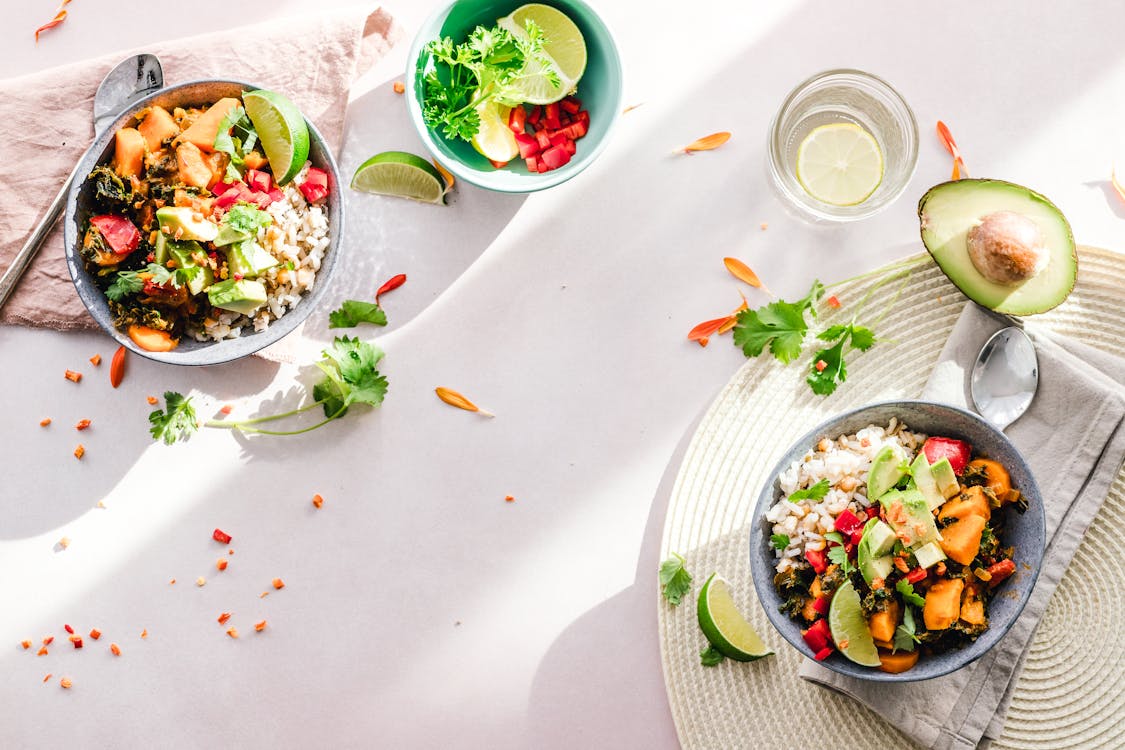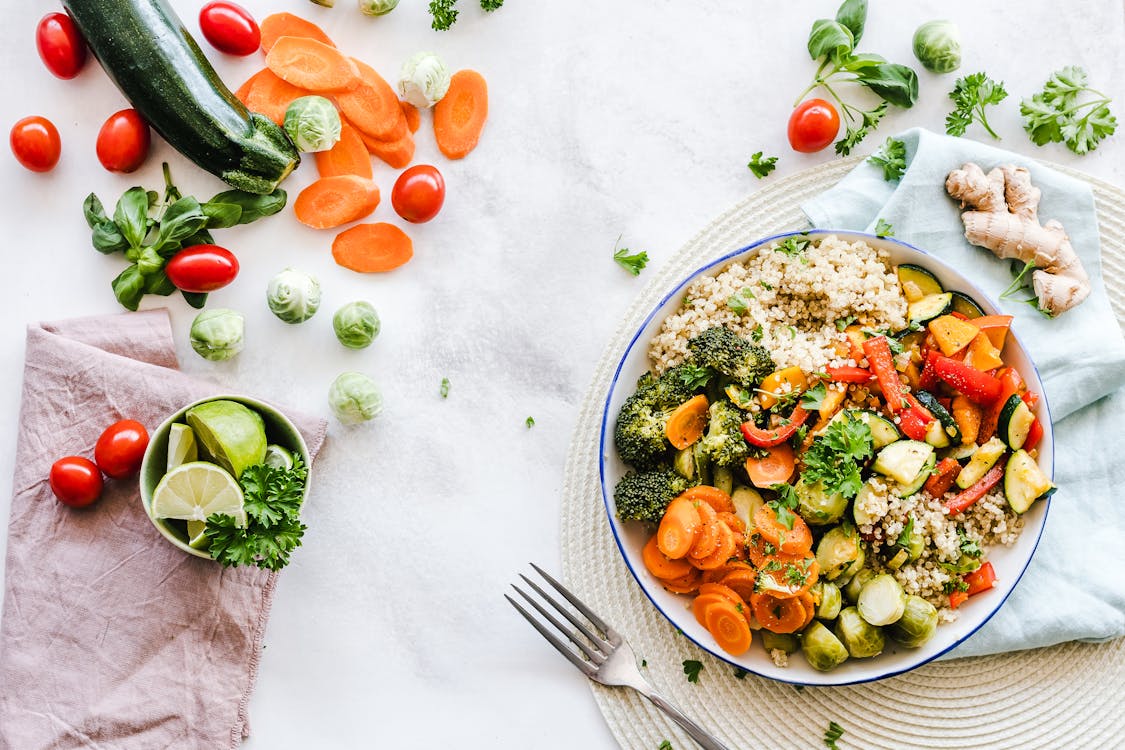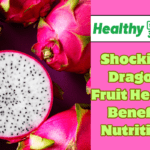11 Best Ways to Improve Your Digestion aka Gut Health
1) Having Healthy and Best Quality Foods
- Making sure your diet supports a healthy gut means choosing natural, unprocessed foods full of nutrients. These foods create a foundation for a gut-friendly grocery list, supporting digestion without causing issues.
- It’s crucial to understand that what’s good for one person’s gut might not work the same way for someone else.
- In the world of gut health, picking foods in their natural form is essential. Simple, whole foods that haven’t gone through a lot of processing keep vital nutrients intact and lower the chances of causing digestive problems.
- A good grocery list for gut health should focus on these natural foods, making the most of their inherent goodness.

2) Consuming green and healthy veggies!
- Eating a mix of fruits in your meals is a smart move for your digestion.
- They have both soluble and insoluble fiber, making sure everything runs smoothly, and your bathroom visits stay on track. Vegetables, with all their colors and nutrients, bring in different fibers that really help keep your gut healthy.
- Whole grains like oats, quinoa, and brown rice aren’t just full of important stuff for your body; they also have fiber that’s key for keeping your digestion regular.
- Beans and lentils, which are types of legumes, are great for adding fiber and protein to your diet. It’s not just about avoiding constipation – these fiber-packed foods also help the good bacteria in your gut.
Read Also:
11 Best Ways to Improve Your Digestion
3) Consuming Fiber Rich Food
- Eating foods rich in fiber is a smart move for a healthy digestive system. These foods, full of fiber, come in different types like fruits, veggies, whole grains, and legumes. They do more than just keep your digestion regular and prevent constipation – they act like prebiotics, taking care of the good bacteria in your gut.
- This is super important because it helps keep a good balance in your gut microbiota, which is a bunch of tiny living things in your gut.
- Adding more fiber-rich foods to what you eat gives your digestive health a solid base. Having a mix of fruits, veggies, whole grains, and legumes doesn’t just help with regular bowel movements; it also creates an environment that supports the growth of good gut bacteria.
- When you make these food choices, you’re actively playing a part in keeping the balance in your gut microbiota, making your digestive system healthier and more resilient over time.
4) Including Fermented Food in Your Diet
- Adding fermented foods to your diet is a good idea for a healthy gut. Probiotic foods, also known as fermented foods, include yummy options like yogurt, kefir, sauerkraut, and kimchi.
- These foods have probiotics, which are good bacteria that do great things for your gut by helping healthy microorganisms grow.
- Eating these foods doesn’t just make your gut healthier; it also gives your immune system a nice boost. The best part is, these foods are usually gentle on your stomach, making digestion easy.
- When you eat probiotic foods like yogurt and kefir, you’re bringing friendly bacteria into your gut. These helpful microorganisms can create a better balance in your gut microbiota, making your digestive system healthier overall.
5) Drinking plenty of Coconut Water
- Coconut water is a great pick for staying hydrated, going beyond just quenching your thirst. Packed with electrolytes, especially potassium, it does wonders for balancing hydration and supporting regular bowel movements.
- The mix of hydration and essential electrolytes in coconut water creates a refreshing drink that not only replenishes fluids but also helps keep your digestive system balanced and hydrated.
- When you go for coconut water, it’s not just a tasty beverage; you’re giving your body a natural source of hydration with vital electrolytes.
- Potassium, a key element in coconut water, plays a crucial role in keeping fluids balanced in and out of cells, ensuring good hydration. This balance of electrolytes also benefits your digestive system, keeping things moving smoothly for regular bowel movements.
Read Also:
Best Exercises And Yoga Poses For A Healthy Lifestyle
6) Following a probiotic rich diet
- Unlike probiotics, which are live helpful bacteria found in some foods or supplements, prebiotic foods are fibers and compounds that act as a yummy feast for these good bacteria.
- These foods are like a buffet for the good bacteria, making them grow and do their job in the gut. Examples of prebiotic foods include acacia gum, raw dandelion greens, raw leeks, raw onions, underripe bananas, and apples with the skin.
- When we talk about prebiotics, we mean special fibers and compounds that our bodies can’t digest, but they’re like a tasty treat for the friendly bacteria living in our gut.
- Unlike probiotics, which are live bacteria themselves, prebiotics are more like the delicious food that keeps these good bacteria well-fed and happy. It’s like making a cozy home for them in our digestive system.
7) Vitamin rich food for better gut health
- Leafy greens like spinach, kale, and broccoli aren’t just tasty; they’re packed with stuff your body loves – things like antioxidants, minerals, and vitamins that keep your gut healthy.
- These colorful greens don’t just make your digestive system happy; they also have extra benefits thanks to their folate content.
- Folate in leafy greens is like a welcome sign for good bacteria in your gut, creating a place where these friendly microorganisms can live and make your digestive health even better.
- Take spinach, for example – it’s not just a flexible ingredient; it’s a nutrient powerhouse with vitamins A, C, and K, plus minerals like iron and calcium. Kale, another green hero, has antioxidants like vitamin C and beta-carotene, helping your gut handle stress better.
8) Sour food which are amazing for a improved health
- Sour foods help a lot with occasional bloating, making your stomach feel steady and comfortable.
- But these benefits go beyond just digestion – sour foods actually have good stuff that can boost your overall health. Adding sour things to your meals doesn’t just make your tummy happy; it’s like a boost for your whole body.
- When it comes to bloating, sour foods do a great job giving relief from the discomfort that comes with stomach issues.
- Plus, the sour taste helps keep your stomach feeling stable and comfy, giving a nice calming effect on your digestion.
9) Apple cider vinegar
- Apple cider vinegar, especially when it keeps the mother, becomes a helpful friend for your digestion by getting your stomach ready for food.
- This special vinegar not only improves how your digestion works but also acts like a prebiotic because it has helpful organisms in the liquid that played a role in making it.
- When you use apple cider vinegar with the mother in your daily routine, you’re not just giving your meals a tangy taste; you’re also getting its digestion perks.
- The acetic acid in apple cider vinegar helps get your stomach ready for the food you’re about to eat, making it easier for your body to break down nutrients and absorb them in your digestive system.
Read Also:
Tips for a Good Night’s Sleep: Creating a Relaxing Bedtime Routine
10) Adding omega 3 rich food stuff
- Eating foods rich in omega-3 is a good idea for a healthy gut. Fish like salmon, sardines, and mackerel are full of omega-3 fatty acids, which do more than just keep your gut healthy – they also help your body handle inflammation.
- It’s not just about fish; you can get omega-3s from nuts, seeds, free-range eggs, and grass-fed beef too. However, fish or omega-3 supplements like fish oil are considered the best sources.
- When you have fatty fish in your meals, you’re getting a bunch of omega-3s that help control inflammation.
- This isn’t just great for your gut; it’s good for your whole body. Nuts, seeds, free-range eggs, and grass-fed beef also bring omega-3s to your plate, giving you other options if you’re not into fish.
11) Drinking plenty of water
- Here’s an easy tip for a healthy digestive system: drink water.
- This simple practice not only helps remove waste but is also one of the best natural ways to support digestion. Surprisingly, some people who think they have poor digestion might just be dealing with dehydration.
- Making sure you drink enough water throughout the day is a basic yet powerful strategy for a healthy digestive system.
- Water is crucial for various digestion processes, breaking down food, absorbing nutrients, and moving waste smoothly through your stomach and intestines.
Bonus Point: Worry less and be stress free!

- Too much stress or worry can make your digestive system work too hard, causing various problems. Stress can harm how well your digestive tract works, disturb the balance of good bacteria in your gut, and raise the chance of inflammation.
- Doing moderate exercise every day has been shown to help deal with this stress, bringing back a sense of balance in your physical, mental, and emotional well-being. Find activities that reduce stress and make you happy, and make them a regular part of your routine to support and keep your digestive system healthy.
- When stress becomes a big part of your life, it affects your body, especially how your digestive system works.
- Stress can make your digestive tract more open, allowing substances to pass through easily and maybe causing inflammation. It can also upset the important balance of bacteria in your gut, which is needed for good digestion and a strong immune system.




